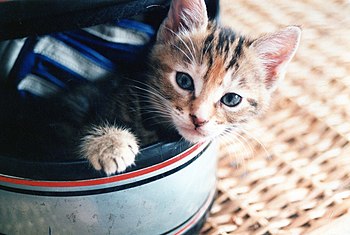| Isn’t it strange where cats and kittens will find to sleep and play? (Photo credit: Wikipedia) |
 |
| A common occurrence in every house that has a dog |
So why do they animals engage in play?
Probably, because they have too much time on hand. Like toddlers who run around the house whole day, our pets are animal toddlers who don’t seem to have much to do, which is why they keep playing. But contrary to my belief, this is far from the truth. This “Play Bow”- as researchers and behaviorists call it is not just restricted to the urban landscape.
Play behaviour is not only seen in our house kitten, but in larger kittens- I mean cats as well. One thing is for certain that this play behaviour seems to be common with, most animals, and one can safely presume, is evolutionary. So could it be, keeping my theory in mind, that animals in the wild, also, like their more docile counter parts in our homes, have a lot of time to kill in the wild as well?
This is also true with Porbeagle sharks, which are studied at the ReefQuest Center for Shark research. These sharks observed at the Cornish Coast, showed repetitive behaviour, rolling while swimming and interaction with manmade and natural objects. In fact many sport fishers are well aware of the curiosity of these guys. The mere repetitive nature of the actions was a hint that this was a frivolous activity that didn’t lead to any attainable goal- or in other words – play. (You might want to go Reef Quest Research Centre website to read more about these fascinating fish). Among fish, it is not just the Porbeagle sharks that have a frivolous nature, cichlids have also been observed to keep themselves entertained in aquariums found playing with the thermometers in the tank.
If that amazes you, wait till you hear this. For all those who believe that reptiles are the quintessential cold blooded species, think again. Researchers have observed that when the environment is stress free, Monitor lizards engage in what can only be called – an identity crisis, where these huge lizards have engaged in shaking shoes, and even retrieving soda can like dog often do. Even salt water crocodiles and turtles have shown to love playing with a tethered ball (Burghart 2014).
Our inherent need to humanize things and for this matter even play, and what we deem as play, which is in turn representative of what we do as play, does not constitute play.
Too much? Well, this is why Burghardt, put forth a new definition of play which said- “play is repetitive, may not seem to have any function, and is indulged in when the animal is most relaxed and in a low stress environment”
For now, I’m comfortable with that.
Citation:
Burghardt, G. (2014). A Brief Glimpse at the Long Evolutionary History of Play Animal Behavior and Cognition, 2 (2) DOI: 10.12966/abc.05.01.2014



